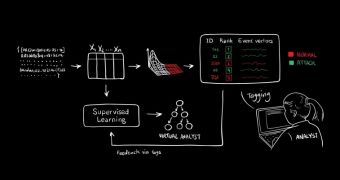MIT's Computer Science and Artificial Intelligence Laboratory (CSAIL), together with researchers from security firm PatternEx, has revealed a new AI (Artificial Intelligence) system called AI2, which can detect 85 percent of cyber-attacks, with false positives rates five times smaller than existing solutions.
The new system doesn't rely entirely on artificial intelligence (AI), but also on user input, something that researchers call analyst intuition (AI), hence its name of AI2.
Researchers said they fed AI2 with over 3.6 billion lines of log files, allowing the system to scan the content with unsupervised machine-learning techniques. At the end of each day, the system presents its findings to a human operator, who then confirms or dismisses security alerts.
This human feedback is then incorporated into AI2's learning system and used the next day for analyzing new logs.
AI2 is much better than existing automated cyber-attack detection systems
After their tests had concluded, MIT and PatternEx researchers said AI2 achieved an 85 percent accuracy rate in detecting cyber-attacks, which is 2.92 times better than similar automated cyber-attack detection systems used today.
Further, the rate of false positive reports was also lower, being five times smaller than what similar cyber-security solutions achieved.
The best thing about AI2 is that, in time, as the AI system gets smarter and can recognize more and more attack vectors, the human input is not needed as in the beginning.
Researchers said that, at first, human operators had to double-check 200 different events per day while in the latter part of the testing phase, this went down to 30-40 events.
"These results show that our analyst-in-the-loop security system is an accurate, scalable, and cost-efficient mechanism to successfully defend against ever-changing attacks," researchers concluded.
The AI2: Training a big data machine to defend research paper was presented at last week’s IEEE International Conference on Big Data Security in New York City.

 14 DAY TRIAL //
14 DAY TRIAL // 